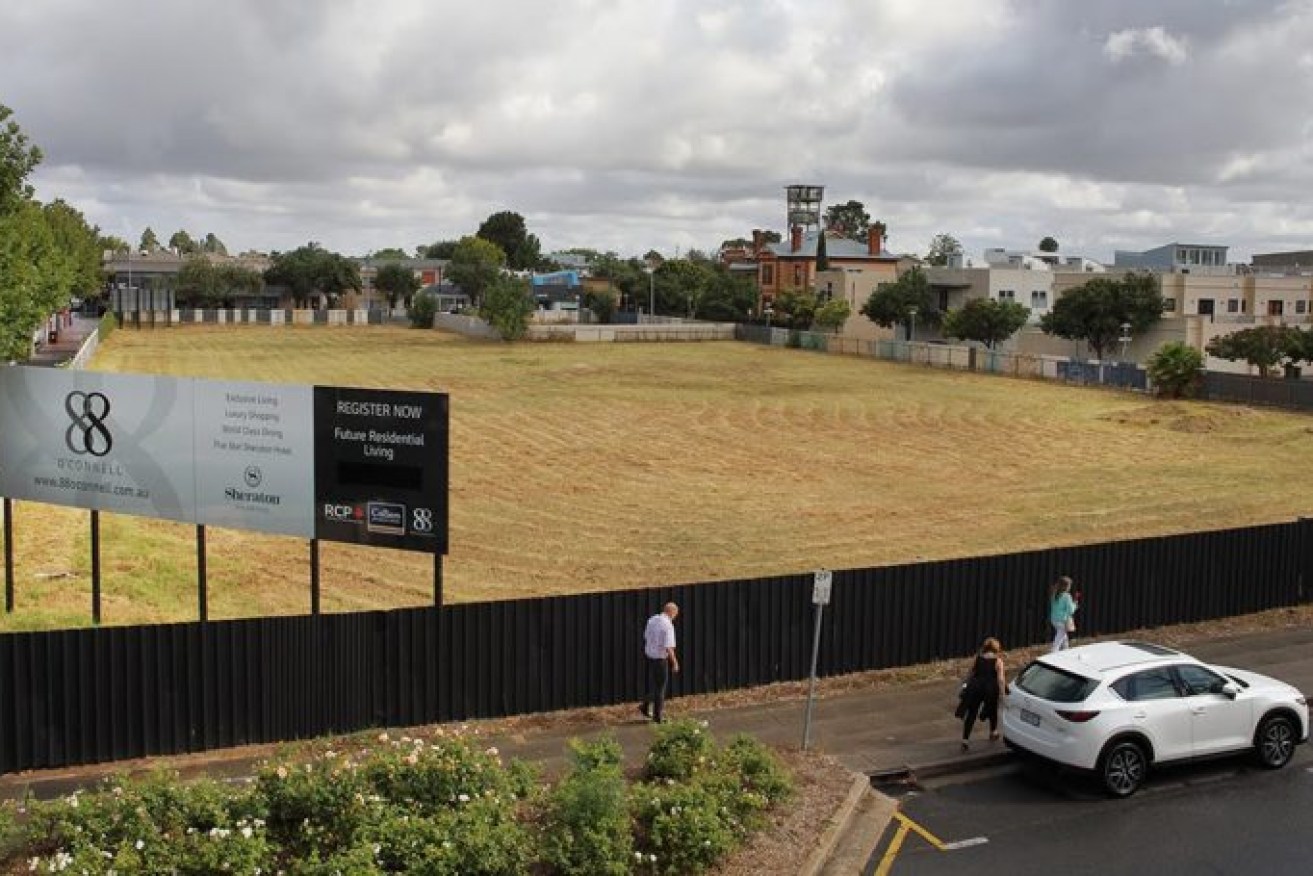City council candidate calls for “systematic” consideration of mental health
A psychologist turned Adelaide City Council candidate says the council needs to pay greater attention to the community’s mental health when making planning decisions.

City council candidate Helen Donovan argues the vacant 88 O'Connell Street site should be used for affordable housing to improve people's mental wellbeing. Photo: Tony Lewis / InDaily
South ward candidate Helen Donovan, a practicing behaviour change psychologist, said planning decisions made by council “immensely impacted” workers and residents’ physical and mental health.
Donovan has called on the council to “rigorously and systematically” consider impacts on mental health at “every level of policy”, including infrastructure design, green spaces, waste management and housing.
According to Donovan, improved mental wellbeing in the community can be achieved by increasing the number of walkways and bike trails, reducing the number of “ugly” high-rise apartment buildings and increasing affordable housing stock.
“The Adelaide City Council has currently got some wellbeing initiatives that they are doing well, but it’s not at the focus of the decision-making process – it’s quite ad hoc,” she said.
“That’s where there is some room for improvement – there should be health policy considered in every aspect of council, from administration to the decision-making of councillors.”
Donovan said by considering mental and physical health in planning decisions, the council could see flow-on benefits, including the potential for increased retail expenditure in the city.
“When you put in excellent active transport – more bikeways through the city or safer walking trails for example – that means that there’s the obvious outcome of improved physical health,” she said.
“All the research shows us that if you get people walking and cycling more, of course, people’s mental and physical health improves because there is increased physical activity and community connectedness significantly improves.
“It also improves retail outcomes because when you put in excellent walking and cycling infrastructure, small shops get more business because people slow down.”
Donovan said the rise of “ugly” apartment buildings was impacting people’s “community connectedness”.
She said building plans should be critiqued by council based on how suited the designs were to improving people’s likelihood of interacting with other residents.
“It goes down to built form – if you just have a whole lot of ugly 23-storey high apartment buildings with no human scale, what happens is this contributes to poor mental health because we’ve got these vertical ghettos with little community connectedness,” she said.
“If you make things on a more reasonable human scale, usually only a couple of floors, even if you’re thinking about development, you’re looking at keeping that human interactivity, that connectedness through communities.”
Donovan said she would advocate for an affordable housing action plan that focussed on increasing affordable housing stock and rental affordability in the CBD.
She welcomed the council’s involvement in the Adelaide Zero Project, which aims to achieve “functional zero homelessness” by 2020, but said more needed to be done to ensure housing solutions extended “far beyond those sleeping rough.”
“Affordable housing and social support services can be dismissed at local council level as the responsibility of state and federal governments,” she said. “This is a complex social issue that will always require a multi-layered approach.”
Donovan recommended the council ban “defensive architecture” – including benches fitted with spikes and other intrusions to prevent homeless people from sleeping – and increase its administrative support for social support organisations in the city.
She also spruiked 88 O’Connell Street as a potential site for affordable housing and rental properties.
“We should be aiming for that 15 to 20 per cent affordable housing – housing that is below the $330,000 mark,” she said.
“88 O’Connell Street – that could be a big opportunity for council to improve affordable housing in the city – it will be 10-storeys high, presumably, so we should be looking at what proportion of those apartments can be affordable.
“It’s not going to be profit-driving but it will work for people who are struggling to break into the housing market and it obviously impacts on mental health and wellbeing as well, (by) having more opportunities for secure, safe housing.”
Donovan said she would also advocate for improved waste management, more “green” spaces and the protection of the park lands.




